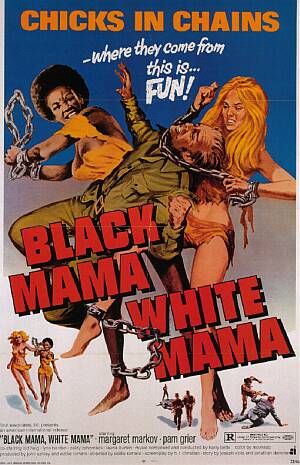★★½
“Bit of an exaggeration, but Fairly Unpleasant Sisters likely wouldn’t have sold.”
 This Philippino phlick doesn’t quite have the courage of its convictions, and is never quite sure whether it wants to be sexploitation or serious drama. The poster promises a lot more than the film actually delivers, which is a shame, as the performances from the three leading ladies are nicely judged – as well as refreshingly multicultural. Two of them (Caffaro and Ortiz, one Caucasian, the other “Oriental”) are sent to prison, but when their torturer (ex-Bond girl Hendry, who initially comes over almost like a Black Ilsa) discovers they may know the whereabouts of a million bucks in cash, she helps spring them, and the trio head off, along with a local hustler (Ashley).
This Philippino phlick doesn’t quite have the courage of its convictions, and is never quite sure whether it wants to be sexploitation or serious drama. The poster promises a lot more than the film actually delivers, which is a shame, as the performances from the three leading ladies are nicely judged – as well as refreshingly multicultural. Two of them (Caffaro and Ortiz, one Caucasian, the other “Oriental”) are sent to prison, but when their torturer (ex-Bond girl Hendry, who initially comes over almost like a Black Ilsa) discovers they may know the whereabouts of a million bucks in cash, she helps spring them, and the trio head off, along with a local hustler (Ashley).
Double-crosses abound, and it all ends in a massive gun-battle on the docks. If this sounds familiar, it’s because Black Mama, White Mama – also directed by Romero, and with Sid Haig as a slimeball – took a very similar route, two years previously. This is marginally more competent, though the attempts at comedy largely don’t work, and sit uneasily alongside the torture sequences, for example. But in the absence of Pam Grier, Hendry steps up nicely, in a role that could easily have been mere caricature, and delivers the right amount of amoral gung-ho.
Nobody’s going to mistake this for great art; even as exploitation, it’s not particularly…well, exploitative, earning its R-rating more through bad language than anything else. But it keeps moving, and is worth a look if you stumble across it on late-night cable.
Dir: Eddie Romero
Star: Gloria Hendry, Cheri Caffaro, Rosanna Ortiz, John Ashley







 The biggest shock this has to offer is likely the opening credit, “based on an original story by Joseph Viola and…
The biggest shock this has to offer is likely the opening credit, “based on an original story by Joseph Viola and… As well as its questionable use of the apostrophe, the cover kinda implies that three girls are involved here, which is only true for a small fraction of the running time. It starts off with
As well as its questionable use of the apostrophe, the cover kinda implies that three girls are involved here, which is only true for a small fraction of the running time. It starts off with  The third series hit the ground running, Michelle Dockley taking evil warder Jim Fenner hostage, after stabbing him in the stomach with a broken bottle (to loud cheers here), and Nikki Wade breaking
The third series hit the ground running, Michelle Dockley taking evil warder Jim Fenner hostage, after stabbing him in the stomach with a broken bottle (to loud cheers here), and Nikki Wade breaking  The DVD holds two films, Sasori: Joshuu 701-gô and Sasori: Korosu tenshi, only tangentially connected to Shunya Ito’s Sasori series (the best-known is Female Convict Scorpion: Jailhouse 41) – it also has a heroine who breaks out of jail, and that’s about it. Here, nurse Nami Matsushima (Komatsu) gets ten years for killing the guy who kidnapped and murdered her sister, though just before he dies, he reveals he had an accomplice. In jail, she faces the usual perils (thuggish cellmate, bisexual warden) and meets a girl on death row, framed for a murder committed by a politician – though she killed a prison guard too, so may deserve to die! As execution looms, Nami plans to save her friend. In part two, after her escape, she gets involved with a hitman, and goes back into the prison, in order to rescue his girlfriend.
The DVD holds two films, Sasori: Joshuu 701-gô and Sasori: Korosu tenshi, only tangentially connected to Shunya Ito’s Sasori series (the best-known is Female Convict Scorpion: Jailhouse 41) – it also has a heroine who breaks out of jail, and that’s about it. Here, nurse Nami Matsushima (Komatsu) gets ten years for killing the guy who kidnapped and murdered her sister, though just before he dies, he reveals he had an accomplice. In jail, she faces the usual perils (thuggish cellmate, bisexual warden) and meets a girl on death row, framed for a murder committed by a politician – though she killed a prison guard too, so may deserve to die! As execution looms, Nami plans to save her friend. In part two, after her escape, she gets involved with a hitman, and goes back into the prison, in order to rescue his girlfriend. Despite its title, Prisoner Maria: The Movie has a different set of influences altogether. First up heroine Maria is only a prisoner for a few minutes; the most obvious reference point is Nikita, and it’s not alone.
Despite its title, Prisoner Maria: The Movie has a different set of influences altogether. First up heroine Maria is only a prisoner for a few minutes; the most obvious reference point is Nikita, and it’s not alone.  Based on a manga by Shigeru Tsuchiyama and Shintaro Iba, this is cheerfully shallow stuff, although the occasional sequences of abuse may have more liberal viewers twitching — the depiction of the serial killer at work is unlikely to survive any British release. Aota wears a selection of tight dresses and short skirts, and performs her action scenes creditably enough, though the likes of Michelle Yeoh will not be losing any sleep. In addition, some thought has clearly gone into the story, which is perhaps where it wins out most convincingly over Scorpion’s Revenge.
Based on a manga by Shigeru Tsuchiyama and Shintaro Iba, this is cheerfully shallow stuff, although the occasional sequences of abuse may have more liberal viewers twitching — the depiction of the serial killer at work is unlikely to survive any British release. Aota wears a selection of tight dresses and short skirts, and performs her action scenes creditably enough, though the likes of Michelle Yeoh will not be losing any sleep. In addition, some thought has clearly gone into the story, which is perhaps where it wins out most convincingly over Scorpion’s Revenge. Women-in-prison is not a genre greatly within our remit, since they’re often just an excuse for a bit of soft-core masochism. There are occasional exceptions, however, and this is one, with its origins as a network TV show forcing restraint of the more exploitative aspects, as well as permitting the characters to develop more fully than in a movie.
Women-in-prison is not a genre greatly within our remit, since they’re often just an excuse for a bit of soft-core masochism. There are occasional exceptions, however, and this is one, with its origins as a network TV show forcing restraint of the more exploitative aspects, as well as permitting the characters to develop more fully than in a movie. Somewhere around the middle of the series, I realised that this is soap-opera, pure and simple. As someone who’d never be seen dead watching a soap, this was disturbing. Fortunately, moments later, Jim Fenner did something else truly rotten to the core, and my attention went back to H.M. Prison Larkhall. Such is the joy of the show: it defies categorization.
Somewhere around the middle of the series, I realised that this is soap-opera, pure and simple. As someone who’d never be seen dead watching a soap, this was disturbing. Fortunately, moments later, Jim Fenner did something else truly rotten to the core, and my attention went back to H.M. Prison Larkhall. Such is the joy of the show: it defies categorization. Scorpion’s Revenge is an understandable, if not really helpful, retitling of a film called Sasori in USA; as this suggests, it attempts to add an exotic flavour by setting things in an uncivilised and/or dangerous locale. Foreigners are, after all, inherently evil, and do far worse things to our women than we ever would. This isn’t new: many of Roger Corman’s 1970’s WiP movies were shot in the Philippines, albeit partly for cost reasons.
Scorpion’s Revenge is an understandable, if not really helpful, retitling of a film called Sasori in USA; as this suggests, it attempts to add an exotic flavour by setting things in an uncivilised and/or dangerous locale. Foreigners are, after all, inherently evil, and do far worse things to our women than we ever would. This isn’t new: many of Roger Corman’s 1970’s WiP movies were shot in the Philippines, albeit partly for cost reasons.